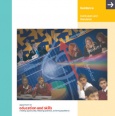Resources with topic CPD
From OER in Education
Relevant resources
| CPD | Questioning Techniques | |

|
How do I question? Thinking about questioning techniques in the classroom This resource explores some alternative strategies to direct questioning(ta) including some advice and activities for supporting teachers in classroom practice.
| |
| CPD | Common Pitfalls in Questioning | |

|
Exploring problematic questions and ways to avoid them Questioning(ta) is a key classroom practice, and skill, and can sometimes fall into the trap of focusing on lower levels, as opposed to higher order(ta) reasoning(ta) and discussion(ta) skills. This resource covers some reasons why this - and other pitfalls - occur, with some practical advice for ensuring high quality questioning in your classroom.
| |
| CPD | Teaching Models | |

|
Concrete preparation – Action – Metacognition – Bridging - Mediation This resource offers advice on planning(ta) for interactive pedagogy. Three sub-sections have been drawn from it (see related DfE resources).
| |
| CPD | Using Thinking Skills | |

|
What do you think? Exploring thinking skills for the classroom This resource highlights higher order(ta) reasoning(ta) skills and activities to prompt their use in classroom contexts.
| |
| CPD | Using Drama Activities in your Teaching | |

|
A lesson by any other name...Using Drama across the curriculum to enhance teaching This resource highlights some strategies to use drama(ta) activities in the teaching of other subjects. Drama(ta) can provide a useful cross curricula(i) way to prompt active learning(ta) and subsequent discussion(ta) and group talk(ta).
| |
| CPD | Teaching for Metacognition | |

|
Thinking about Thinking, in the classroom context This resource describes some strategies to engage metacognitive reasoning(ta) - thinking about thinking, for example, asking pupils to think about their own learning techniques. It includes activities to assist teachers in planning(ta) for their own teaching.
| |
| CPD | Subject Specific Vocabulary | |

|
What's that word? Thinking about the language used in your subject This resource highlights the importance of subject-specific vocabulary(ta) and its consideration in teaching as well as offering some practical tips for encouraging its effective use, and remembering in classroom contexts.
| |
| CPD | Structuring Learning | |

|
Thinking about sequencing and planning for high quality pedagogy The resource includes relevant information regarding lesson and curriculum planning(ta) for high quality pedagogy.
| |
| CPD | Sharing Learning Objectives and Outcomes | |

|
What will they achieve - outcomes, objectives, and their importance This resource highlights the link between learning objectives(ta) and assessment(ta) for learning, and explores ways to engage in planning(ta) for, and write good learning objectives - which identify the learning to take place, as opposed to just the activity with which the pupils will engage.
| |
| CPD | Planning for Inclusion | |

|
Planning for inclusion in your classroom This resource discusses planning(ta) for inclusion(ta), in particular as related to active learning(ta), group talk(ta) and more generally interactive pedagogy.
| |
| CPD | Choosing and Selecting Groups | |

|
What group am I in? Thinking about choosing and selecting groups This resource discusses various options for choosing groupings for group work(ta) activities, and their benefits and limitations.
| |
| CPD | Questioning - Bloom's Taxonomy | |

|
Developing questioning through Bloom's taxonomy This resource discusses questioning(ta) and Bloom's taxonomy - which, at the higher levels, can be linked to higher order(ta) thinking skills and reasoning(ta).
| |
| CPD | Encouraging Pupils to Ask Effective Questions | |

|
Getting pupils to do the questioning This resource describes some methods to encourage pupils themselves to engage in effective questioning(ta) - an active learning(ta) approach which may be useful in whole class(ta) or group work(ta) discussion(ta).
| |
| CPD | Guide to the DfES Resource | |

|
Pedagogy and Practice: Teaching and Learning in Secondary Schools: Leadership guide This resource provides a general overview of the DfES Pedagogy resources (see related resources/below).
| |
| CPD | Giving Written Feedback | |

|
Effective methods for written feedback This resource discusses written feedback in the context of assessment(ta) and giving clear learning objectives(ta) from any feedback given. While such feedback is often on homework(ta), the resource is intended more broadly than that.
| |
| CPD | Developing Good Explanations | |

|
Say that again? Developing good explanations for classroom teaching This resource explores some characteristics of good explanations (including linking to questioning(ta)), explaining these thoroughly and linking them to pupils' ability to engage in active learning(ta)
| |
| CPD | Group Work - Group Size | |

|
What size group are we in today? Thinking about group size This resource discusses group work(ta) sizes, and the practical benefits and limitations of various group sizes - from individual work to whole class(ta) work.
| |
| CPD | Group Work - Maintaining Momentum | |

|
Keep going! Maintaining momentum in group work activities This resource discusses some practical classroom management(ta) strategies for maintaining momentum in group work(ta) activities.
| |
| CPD | Giving Oral Feedback | |

|
Developing good practice in giving oral feedback This resource discusses giving oral feedback, particularly in the context of assessment(ta), which could include whole class(ta) discussion(ta) or group talk(ta), as well as questioning(ta) contexts.
| |
| CPD | Establishing Purpose for Writing | |

|
Why do we have to write it down? Thinking about why we write... This resource highlights some key types of text, and asks teachers to think about the key texts and language(ta) in their own subjects, and how tasks can be well designed to illicit purposeful writing in their classroom practice. Teachers should consider learning objectives(ta) for purposeful writing.
| |
Pages in category "Resources with topic CPD"
The following 25 pages are in this category, out of 25 total.

